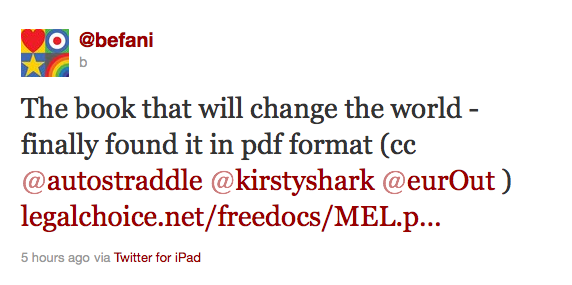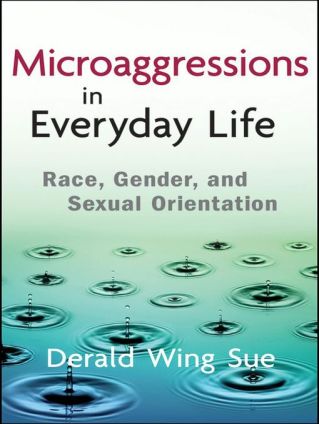
 Usually when somebody tweets at Autostraddle about a book we should download, I prepare myself for the almost certain possibility of a self-published lesbian romance novel with unfortunate computer-created cover art and at least four grammatical errors on the first page. But this wasn’t that, thank the Lord. This was something much better!
Usually when somebody tweets at Autostraddle about a book we should download, I prepare myself for the almost certain possibility of a self-published lesbian romance novel with unfortunate computer-created cover art and at least four grammatical errors on the first page. But this wasn’t that, thank the Lord. This was something much better!
Microaggressions in Everyday Life: Race, Gender, and Sexual Orientation was released last year by Derald Wing Sue, Professor of Psychology and Education in the Department of Counseling and Clinical Psychology at Teacher’s College, Columbia University.
Microaggressions in Everyday Life: Race, Gender, and Sexual Orientation is about the damaging consequences of everyday prejudice, bias, and discrimination upon marginalized groups in our society. The experience of racial, gender, and sexual-orientation microaggressions is not new to people of color, women, and LGBTs. It is the constant and continuing everyday reality of slights, insults, invalidations, and indignities visited upon marginalized groups by well-intentioned, moral, and decent family members, friends, neighbors, cow- orkers, students, teachers, clerks, waiters and waitresses, employers, health care professionals, and educators. The power of microaggressions lies in their invisibility to the perpetrator, who is unaware that he or she has engaged in a behavior that threatens and demeans the recipient of such a communication.
While hate crimes and racial, gender, and sexual-orientation harassment continue to be committed by overt racists, sexists, and homophobes, the thesis of this book is that the greatest harm to persons of color, women, and LGBTs does not come from these conscious perpetrators. It is not the White suprema- cists, Ku Klux Klan members, or Skinheads, for example, who pose the greatest threat to people of color, but instead well-intentioned people, who are strongly motivated by egalitarian values, believe in their own morality, and experience themselves as fair-minded and decent people who would never consciously discriminate. Because no one is immune from inheriting the biases of the society, all citizens are exposed to a social conditioning process that imbues within them prejudices, stereotypes, and beliefs that lie outside their level of awareness. On a conscious level they may endorse egalitarian values, but on an unconscious level, they harbor antiminority feelings.
Although I’d honestly like to spend the rest of the week reading this and then interviewing Derald Wing Sue for Autostraddle, I’m too f-cking busy. So I’d like to open this up to you — are you interested in reading this entire book and then interviewing Derald Wing Sue for Autostraddle? We’d give you a month and send you the book. You’ll need to be a self-starter comfortable with all aspects of soliciting and executing an interview. You need a strong background in this kind of material and experience writing outside of an academic context — in other words, you need to be able to write conversationally, not like it’s a thesis.
If this sounds like a thing you want to do, email autostraddle [at] gmail dot com.



I wish I had time to do this.
For those interested in more on this whole conept, Asher Bauer over at Tranarchism wrote a really amazing piece on microaggressions in his life. I highly, highly recommend it: http://tranarchism.com/2011/03/04/a-day-in-the-life-of-an-angry-transsexual/
That was a very interesting post. Thanks for sharing! One of the commentors on that post linked to this tumblr and I thought I’d share, since I know how much we all love tumblr!
Arg. If I didn’t have a friggin’ dissertation to finish asap I’d be all over this. In fact, I should be working on it right now. :(
LOLOLOLOL
COW-ORKERS
Also this seems to be exactly the type of book I need. I wish I had the time.
For a second there, I thought even the cows were out to belittle me. I don’t think I could bear it.
Is “to ork” a legitimate verb
it needs to be
I need to be able to say “ORK YOU”
I’m totally going to read this book! Too bad I’m absolute shite at interviewing, or I’d be all about volunteering for that article.
Oh hai, now I know what to call what happened last night on the train when Drunk Mumbling Dude stared and leered at me, observing that I was dressed “like a guy” (wearing a tie and suit jacket after a fancy work dinner). Microaggression, huh? Maybe I oughta read this book.
I’d say leering and using “like a guy” in the pejorative qualifies as outright harassment.
ok the person hunt is over i got a lot of emails and a person is doing it wheee
i actually started reading this book, and while the concept of microaggression is extremely relevant today, i can’t help but have rebuttals on some of Dr. Sue’s examples of microaggression.
50 pages in and this book has made me question the intentions of other as well as myself when using phrases
i can’t wait for the article to be updated so there can be more of a discussion, and hopefully this interview will give me a better perspective on how to localize his vignettes
I really enjoy reading this blog about microaggressions: http://microaggressions.com/
Scanned through the book and it really bothers me that identity is continually evaluated along single axes. I’m not just Chinese one day, a woman another day, and queer the next. These microaggressions don’t pinpoint one aspect of my identity and just affect me in that way. This ebook fails to adequately address intersectionality.
Want to talk about microaggressions? Let’s talk about how this book addresses sexism and sexual orientation by evaluating the experiences of white women and white queers without admitting that it does so. How’s that for (in)visibility?
I had to read another textbook that he wrote for a class (well I read the first several chapters, then got busy) and I really wasn’t too impressed with him either. I thought he looked at things as really one-dimensional and the sections on lgbt people were really inadequate.
yes Kat!! right on! agree!
That point totally came up in his presentation on this topic while I was working at TC. He was really open to the comments from everyone – I’m surprised he did not cover those intersections in the text. I wonder if he has other papers and further research on the topic.
It could have been his publisher as well.
But yes that rebuttal was all over the place during the break-out session!
THIS!
Derald Wing Sue presented at my employee orientation at TC! I was so not looking forward to that day either (employee training day = eye roll!) but his presentation changed my world!
Heh. I have been referring to these as “microdisses” for a few years. I sometimes think of making a list of what goes on during my day, but I think if I did that I would disappear into a hole with a barrel of absinthe.
All I can say is I agree with this 100%. I mean, it’s pretty easy to fly in the face of the blatant haters. It’s a lot harder to deal with who like to think they’re well-intentioned but are still prejudiced. For one, combating those people often gets you less sympathy than when you are combating the people who wear their prejudice on their sleeves. It’s easy for anyone to rally around how awful Fred Phelps is; it’s harder to deal with people who are like “well I don’t hate gay people I just don’t think it’s normal.” I know a lot of people who are like, well, if they aren’t trying to harm you, what business of yours is it what they think?
I was actually just reading some stuff about Harry Potter today, and I like how J.K. Rowling depicted microaggressions in the Harry Potter books. Most of the time the book spends on the issue of “blood purity,” it talks about the people who are blatantly prejudiced against Muggle-borns – but there are some instances where you can see how the prejudice still lingers even in people who are opposed to the Death Eaters. Like in Slughorn’s comments about how shocked he was that Lily, a Muggle-born witch, was so powerful. (Yeah, I know, I know way too much about Harry Potter…)
I think the most egregious thing in this book is the conflation of trans* people with queer people. [I don’t care for being reffered to as “an LGBT” much either, but I can move past that.] The community is inclusive, but we are affected by sexism, homophobia, heterosexism, transphobia, and gender policing in different ways as individuals.
*disclaimer: I haven’t actually finished the sexual orientation chapter, and it’s blocked on this computer so I can’t check back for reference. Maybe it’s not as bad as I think.
Did I seriously just read this?: “It is not the White supremacists, Ku Klux Klan members, or Skinheads, for example, who pose the greatest threat to people of color, but instead well-intentioned people, who are strongly motivated by egalitarian values, believe in their own morality, and experience themselves as fair-minded and decent people who would never consciously discriminate.”
Really? I suppose it’s good that we live in a world where someone can be so inexperienced as to say this, but come on: the first three things will FRIGGING KILL YOU and the other thing will not. I think I’d rather be mildly and systemically inconvenienced, thanks.
I’m pretty sure the claim is not that a single microaggression poses a greater threat to a person of color than, say, a single instance of being lynched by Klansmen; the latter is clearly worse. Rather, the claim, I think, is about these two kinds of aggression when they are weighted according to the frequency with which they occur: microaggressions, which the average person of color experience several times daily, do more damage to the average person of color than, say, being lynched, which the average person of color alive today in the U.S. has never experienced.
I’m replying to a nine-months-old comment that itself followed the immediately preceding comment by nearly two years. I wonder whether anyone will ever read this.